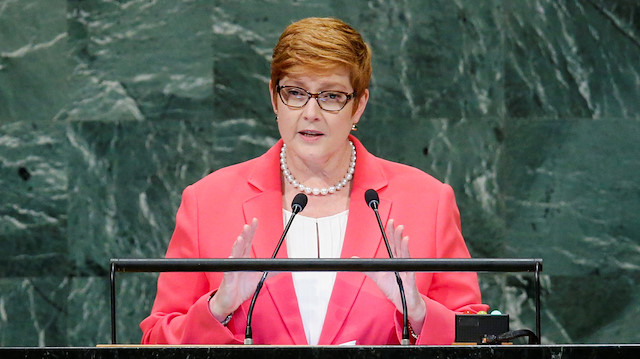

Australia's Foreign Minister Marise Payne
Australian Foreign Minister Marise Payne will travel to China this week, the two governments announced on Monday, as China ended an unofficial suspension for more than six months of visits by top Australian government ministers.
Ties between the two countries, which compete for influence in Asia and particularly in the Pacific, have been strained since Australia accused China of meddling in its domestic affairs late last year.
Ending the stand-off, China's foreign ministry said Payne's visit, which begins on Wednesday, will include talks with State Councillor and Foreign Minister Wang Yi.
Her trip is being seen in Australia as a bid by China to seek warmer ties with Australia's recently installed Prime Minister Scott Morrison.
"I am looking forward to discussions with Minister Wang to enhance bilateral understanding and cooperation across the full range of Australia's interests, spanning strategic, economic and people-to-people connections," Payne said in a statement.
In Beijing, Chinese Foreign Ministry spokeswoman Hua Chunying noted that Payne and Wang had met in September on the sidelines of the U.N. General Assembly and had reached "an important consensus" on ties.
"We are willing to work hard with the Australian side on the basis of mutual respect, equality and benefit to expand exchanges and cooperation in all fields, to promote Sino-Australian relations to achieve new developments," Hua told reporters.
In August, Morrison become Australia's sixth different prime minister in the last decade after a backbench revolt ousted his predecessor, Malcolm Turnbull, who criticised China and banned its Huawei Technologies Co from Australia's broadband network.
Morrison has steered clear of foreign affairs.
"Morrison has been entirely focused on domestic politics, avoiding a lot of Turnbull's foreign policy. No doubt this has been warmly received by China," said Michael O'Keefe, head of politics at La Trobe University in Melbourne.
Signs of warmer ties will cheer Australia's business community after the diplomatic row spilled over to hit two-way trade, most notably, sales of Australian wine.
Australian wine shipments, including those produced by Treasury Wine Estates and Pernod Ricard, in June experienced temporary Chinese custom delays.
China is Australia's top goods and services trading partner, accounting for 24 percent, or A$183.4 billion ($131.88 billion), of total trade in 2017, according to data from the Department of Foreign Affairs and Trade.
"China sees an opportunity to seek a reset of the bilateral relationship on its preferred terms," John Lee, previous foreign minister Julie Bishop's former principle adviser, told Reuters.
China never officially announced a block on visits by Australian officials but in June, Australia asked China to facilitate a visit for Bishop to travel for biennial talks with her counterpart.
China never formally responded and Bishop never made the trip.
#Marise Payne
#Australia
#China
#trade



